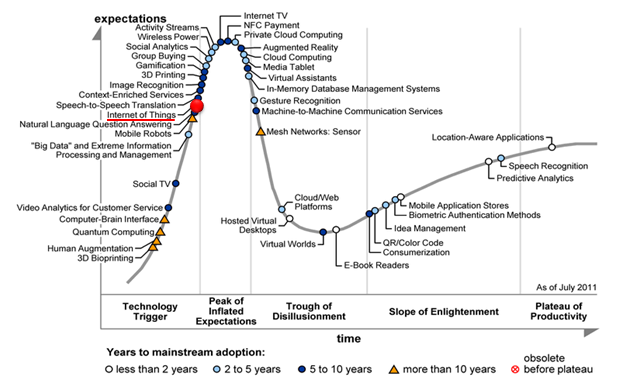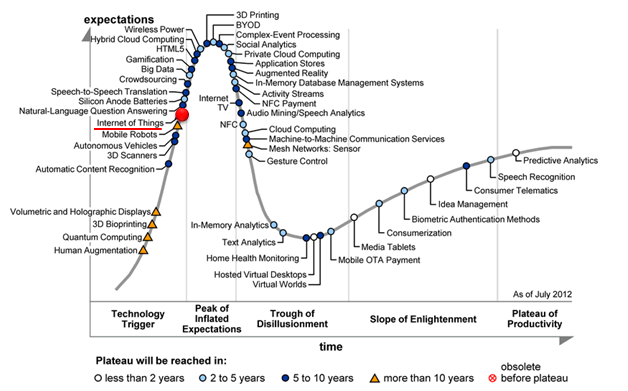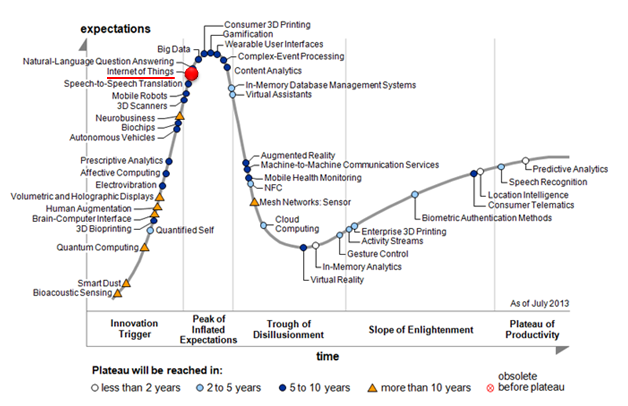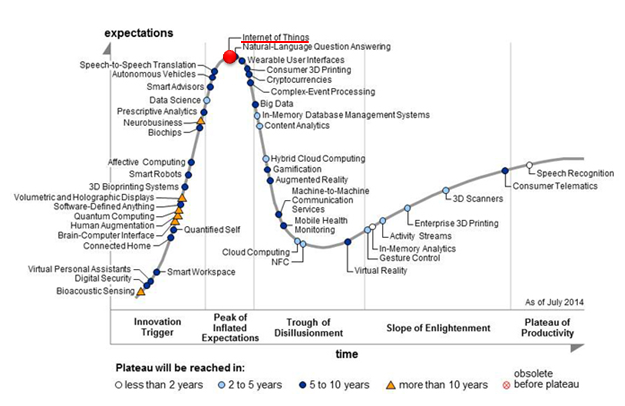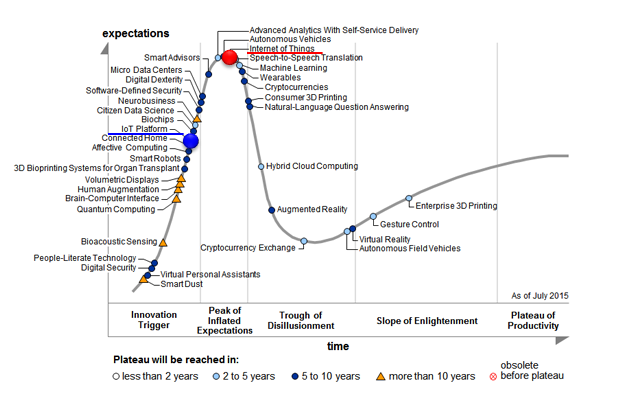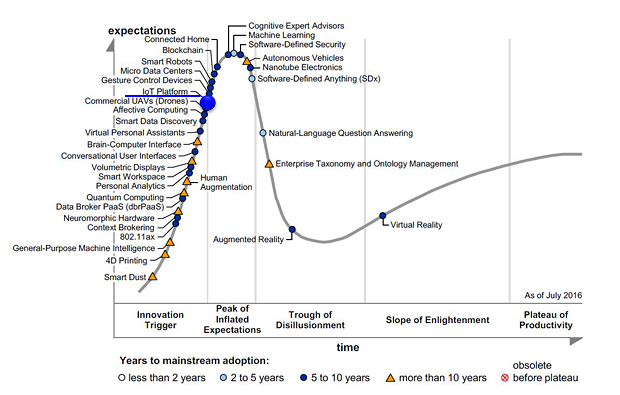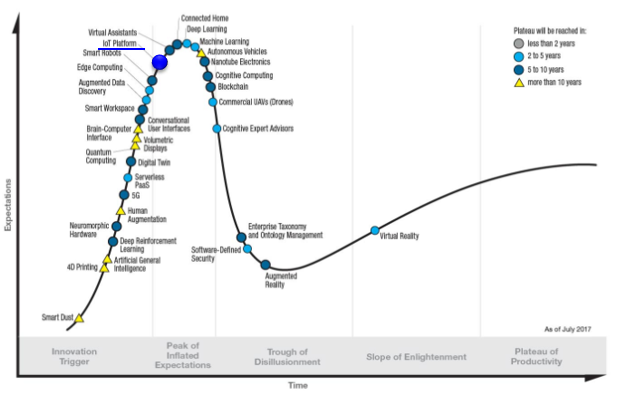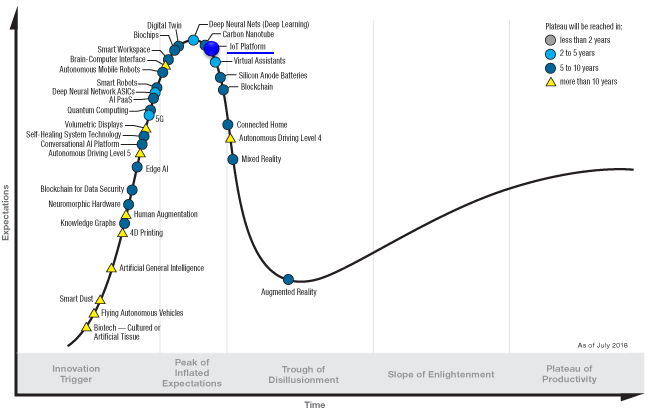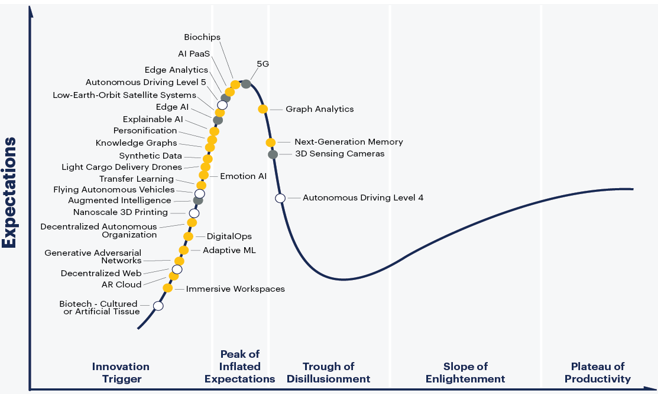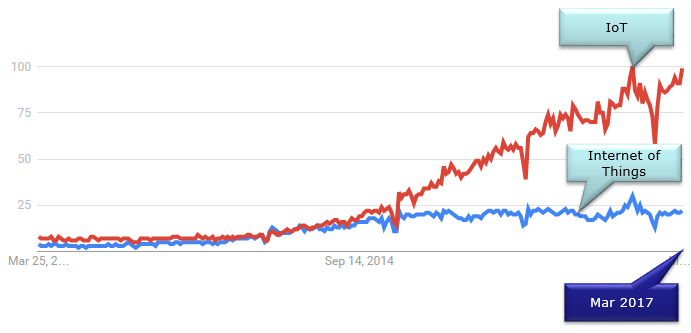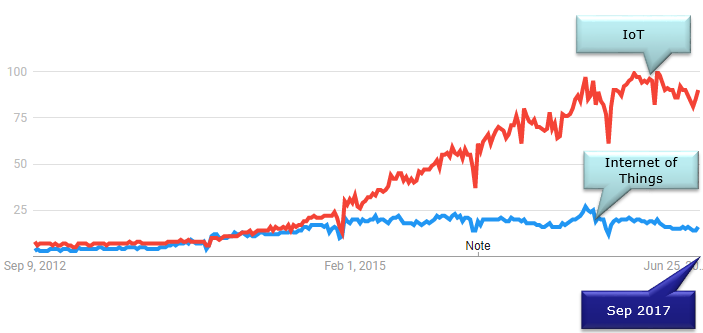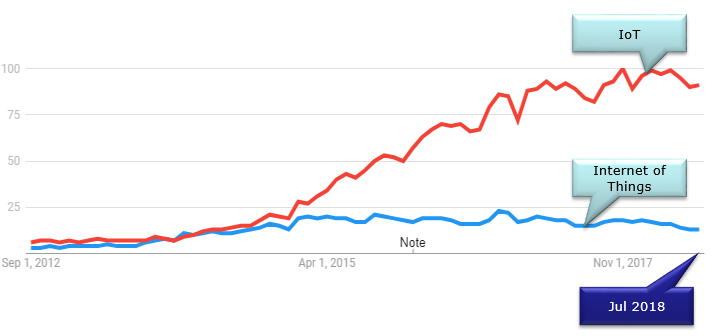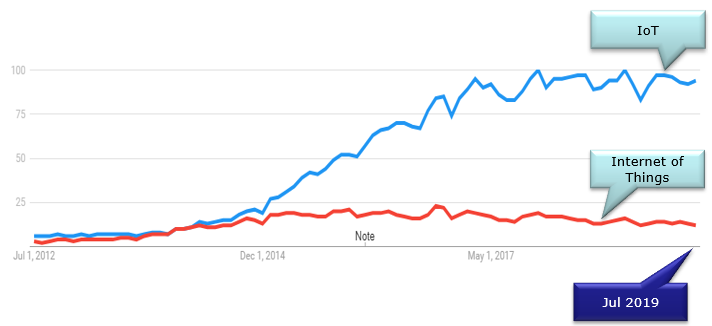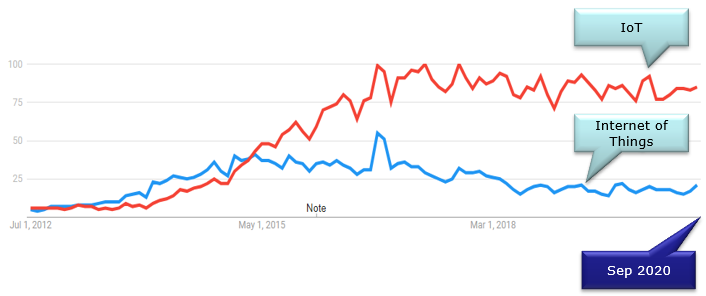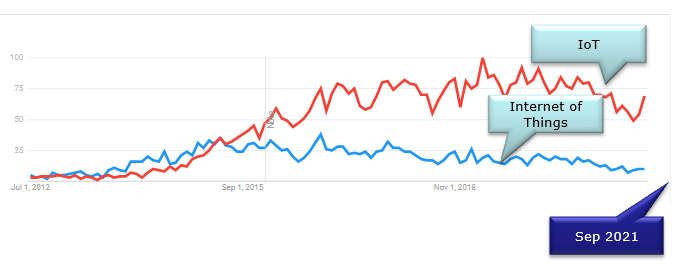|
IoT (Internet Of Things) |
||||||||||||||||||||||||||||||||||||||||||||||||||||||||||
|
When to come ?
Even though I don't agree with exact time scale of the curve, but I am a strong believer of Hype Curve (Gartner) in terms of overall life cycle of emergying technologies. (If you are new to Hyper Curve, you can easily get explanation and tutorials on the web). According to my personal experience/observation on USB, Bluetooth, SmartPhone .. all of these has followed this curve. It is also a good stuff to kill time.. pick any item or industry that you personally are interested and google the path on the curve.
In summary,
Does it mean that IoT is already dead ? or so mature that it is not classified as an emerging technology any more ? I don't think it is dead nor mature. It looks abvious that the IoT story does not seem to go through as the initial visionaries hoped/expected, but I think they are slowly growing in the background starting from various home automation / surveilance systems and various other household electronics over WiFi. I am not sure when IoT over Cellular or IoT specific Wireless technology will spread as early visinaries hoped, but I think we will see gradual growth of IoT over WiFi will continue for next few years to come.
Following is the Hype Curve for IoT that I found and I will keep updating as I find the latest.
Another way to foresee some near future would be to check Google Trend. Following is what I checked in Google Trend. The tricky thing is to figure out proper keywords that can best capture what you are interested in. IoT case this is even more difficult since there are too many words hovering around directly or indirectly indicating this area (e.g, IoT, Internet Of Things, Machine to Machine Communication, M2M, MTC etc). I just picked the two keywords that I think are the most common words and got the trend chart as below.
Is it good timing, Now, to jump in ?
As of Now (Jun 2015), IoT is not at a good spot on the curve since it was already at the peak a year ago and I might have starting sliding down into long/dark tunnel of 'Trough of Disillusion'. ==> Adding Comments on Jan 2020. It seems the situation hasn't went very well as I described below (about 4 year and half year ago). We still don't see any matured IoT industry even now. See Why So Slower than Expected. NOTE : Please take my comments below as a reference. As of now (Nov 2021), It doesn't seem that my expectation / assumption was right around 6 years ago, but I decided to leave my original comment as it is just to track down my own line of thinking over time.
If you are front end marketing/sales people who needs to make money right away, it would be not a good timing to step in because you would see almost nobody talking about this even before you have any tangible things to sell. But if you are on more strategic/long term marketing, it would not be a bad timing to get in. In many technology, most of R&T starts during the time when there is no hype/no fancy words/no buzzwords. It would be good timing to search and establish the relationship for the potential customer. By the nature of IoT architecture/eco-system, it would be highly likely that it is going to be 'long tail' market rather than conventional '80-20/90-10' market. So finding smaller but more customer will be extremely important in terms of product marketing.
If you are a decision maker on the investment in a company, definitely you may want to wait until the mid/end of Slope of Enlightenment. I would try the same if I am a decision maker because you can minimize the risk for the investment. But it should not be like that for several reasons. i) If every company decide to wait until that point, the industry and ecosystem will never form and no chance to sell forever. Of course, the best strategy would be to let other take all the risk and you will get in the market when everything is clear... but that would be the area of high level game theory .. finding Nash Equilibrium ? :).
ii) There is another reason why the decision maker should not wait too long. As you might have experienced, no technology can be implemented overnight however simple it sound like. If you start too late, you will be struggling for selling unmature product in the market and end up losing the whole market by the time your implementation is mature.
If you are a R&D person and your company decided to chase this market, I think this is the best timing. This (following a couple of years) would be only period during which you calmly sit in front of desk and doing a real R&D without being disdurbed by Sales/Marking section saying 'We need this, We need that.. my big customer want this and the deadline is yesterday' . No offense for Sales/Marketing people. I know you are the person who bring in the bread and buffer for my survival :)
My personal opinion ? I agree with the hyper curve, but I am a little bit more optimistic in terms of time scale. Considering the accelerating nature of technical development, we may see a little early see the next phase than the current curve estimate.
In the past several month (as of Mar 2017), I have seen several promosing events and trends that make me think 'I am not sure exactly when we see IoT as many dreamers are talking about, but at least it seems that something tangible (touchable) trends are happening in this area'. Those things that attracted my attention were
However there are still many things that has a pretty long way to go (just in my personal opinion). Followings are some of these list
As of now (Jan 2020), we don't see any hypes or talks about IoT as before but it is obvious that IoT is not yet in the matured state of the industry. Just as a simple indication, look through the series of Gartner's Hypecurve. IoT started appearing in 2011 and stayed there until 2017.. then appeared as a little bit different name in 2018 .. finally completely disappeared in 2019. Why ? Let's think again about a few key claims that had often been mentioned about IoT devices.
Which radio technology would be the major technology for IoT ? WiFi ? or Cellular ? or IoT specific technologies like LoRa, SigFox, ZigBee ? At least for now (Oct 2021), the answer seems to be obvious (at least to me). I think it will be WiFi for many years from now. The advantage of WiFi over other technology can be listed as follows.
Of course, nothing is perfect and there are drawbacks with WiFi as listed below.
I think at least for now (Oct 2021), the advantage of WiFi based IoT devices outweights the disadvantage. Cellular people has been making efforts to put emphasis on the list of WiFi drawbacks because most of the WiFi drawbacks are resolved in celluar by design. However the question is 'How much of IoT application are really concerned about those drawbacks ? How much of IoT manufacturer or end-user are willing to pay extra cost to switch to Cellular in order to remove the WiFi drawback ?
Reference
YouTube
|
||||||||||||||||||||||||||||||||||||||||||||||||||||||||||
